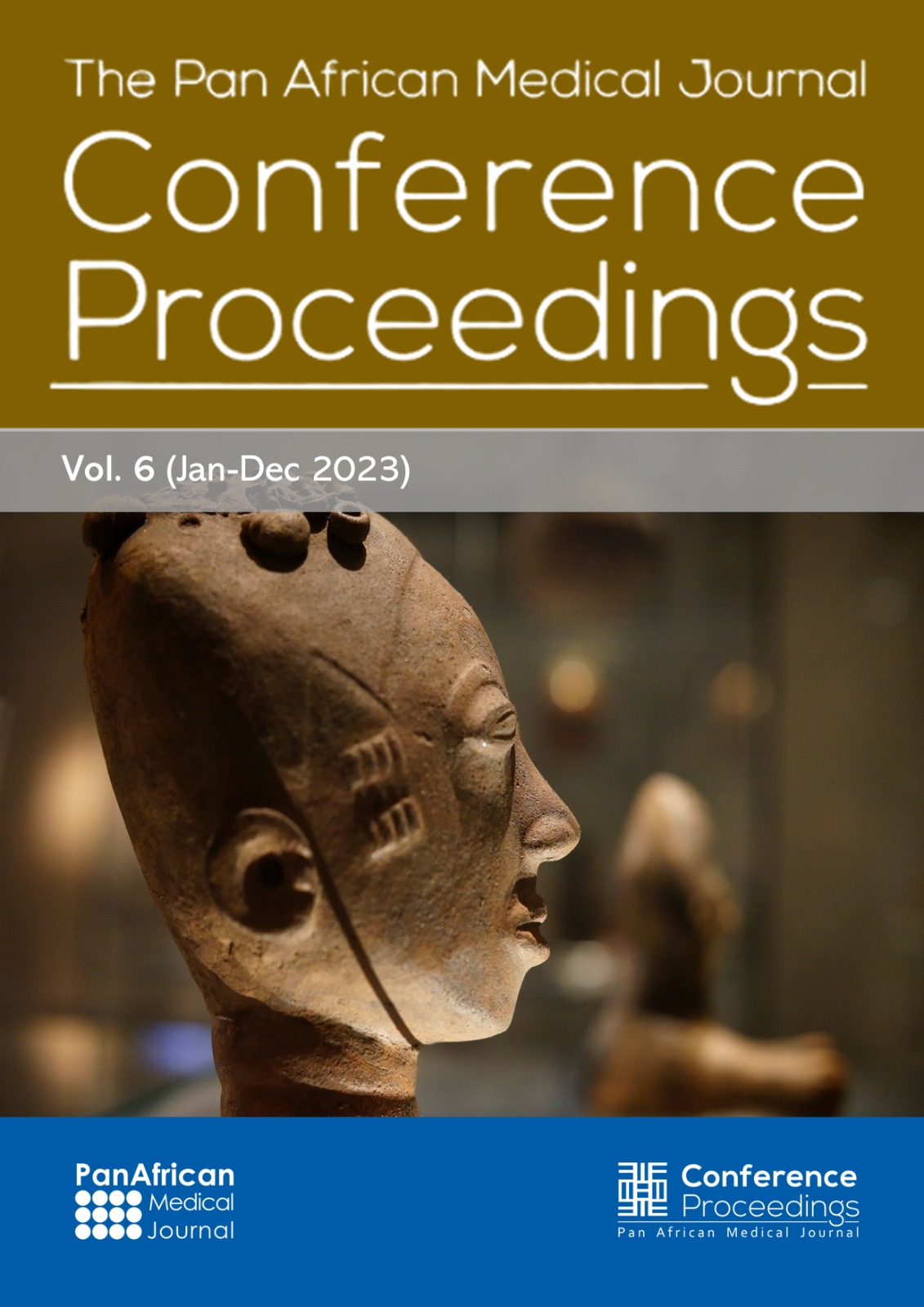Conference abstract
Knowledge, attitudes, and practices of students towards malaria at the University of Douala, Cameroon
Pan African Medical Journal - Conference Proceedings. 2023:18(32).03
Oct 2023.
doi: 10.11604/pamj-cp.2023.18.32.1975
Archived on: 03 Oct 2023
Contact the corresponding author
Keywords: Knowledge, attitudes, practices, malaria, students, Douala
Poster
Knowledge, attitudes, and practices of students towards malaria at the University of Douala, Cameroon
Tchuisseu Kouayep Raïssa Libine1,&, Ahmadou1, Mbohou Nchetnkou Christian1, Essangui Estelle1, Tako Alex1, Adikrafoga Léopold1, Toutcha Amita1, Nangang Prestige1, Tankoua Roméo1, Fofé Boris1, Mépoubong Alida1, Lehman Léopold Gustave1
1University of Douala, Douala, Cameroon
&Corresponding author
Introduction: malaria is the leading cause of mortality and morbidity in Africa. students live in Douala in the Holoidema area with permanent transmission of malaria and the University of Douala is located there. To introduce appropriate preventive and control measures, assessment of students’ levels of KAP about malaria is important. This study aimed to examine the knowledge, attitudes, and practices (KAP) of students facing malaria at the University of Douala
Méthods: this cross-sectional, prospective study was conducted from 18 to 21 October 2021 among students aged 15 to 36 years. To determine the level of KAP toward malaria, a structured and pretested questionnaire was applied to the students to assess the level of KAP related to malaria. All data were entered into an Excel spreadsheet and then analyzed using Statistical Package for the Social Sciences (SPSS) version 20 for Windows (SPSS Inc., Chicago, IL, USA). Quality of fit and chi-square independence (χ2) were used to compare proportions. Statistical significance was set at P < 0.05.
Results: of the 400 students who completed the questionnaire, 31.7% had poor knowledge of the parasite, 10% did not know the mode of transmission of malaria, 21.8% mentioned paracetamol as an antimalarial, 46% did not know at least one antimalarial, 30.7% practiced self-medication. Only 26% of students had bad knowledge, 49% of respondents had bad attitudes and 69% of students had bad practices regarding malaria. Women had a higher level of KAP (p = 0.038) than men. FMSP (Faculty of Medicine and Pharmaceutical Sciences) students had a higher KAP than students from other colleges (p = 0.016).
Conclusion: this study revealed that the majority of students had bad knowledge, attitudes, and practices towards malaria. Although most of the students had a good knowledge of malaria, this did not translate into good practice. It is necessary to develop awareness strategies for malaria control in this study population.
Knowledge, attitudes, and practices of students towards malaria at the University of Douala, Cameroon
Tchuisseu Kouayep Raïssa Libine1,&, Ahmadou1, Mbohou Nchetnkou Christian1, Essangui Estelle1, Tako Alex1, Adikrafoga Léopold1, Toutcha Amita1, Nangang Prestige1, Tankoua Roméo1, Fofé Boris1, Mépoubong Alida1, Lehman Léopold Gustave1
1University of Douala, Douala, Cameroon
&Corresponding author
Introduction: malaria is the leading cause of mortality and morbidity in Africa. students live in Douala in the Holoidema area with permanent transmission of malaria and the University of Douala is located there. To introduce appropriate preventive and control measures, assessment of students’ levels of KAP about malaria is important. This study aimed to examine the knowledge, attitudes, and practices (KAP) of students facing malaria at the University of Douala
Méthods: this cross-sectional, prospective study was conducted from 18 to 21 October 2021 among students aged 15 to 36 years. To determine the level of KAP toward malaria, a structured and pretested questionnaire was applied to the students to assess the level of KAP related to malaria. All data were entered into an Excel spreadsheet and then analyzed using Statistical Package for the Social Sciences (SPSS) version 20 for Windows (SPSS Inc., Chicago, IL, USA). Quality of fit and chi-square independence (χ2) were used to compare proportions. Statistical significance was set at P < 0.05.
Results: of the 400 students who completed the questionnaire, 31.7% had poor knowledge of the parasite, 10% did not know the mode of transmission of malaria, 21.8% mentioned paracetamol as an antimalarial, 46% did not know at least one antimalarial, 30.7% practiced self-medication. Only 26% of students had bad knowledge, 49% of respondents had bad attitudes and 69% of students had bad practices regarding malaria. Women had a higher level of KAP (p = 0.038) than men. FMSP (Faculty of Medicine and Pharmaceutical Sciences) students had a higher KAP than students from other colleges (p = 0.016).
Conclusion: this study revealed that the majority of students had bad knowledge, attitudes, and practices towards malaria. Although most of the students had a good knowledge of malaria, this did not translate into good practice. It is necessary to develop awareness strategies for malaria control in this study population.








